Authors
Graeme Dobell

Graeme Dobell, a journalist since 1971, has been reporting on Australian and international politics, foreign affairs and defence, and the Asia Pacific since 1975.
In 2013, he became Journalist Fellow with the Australian Strategic Policy Institute, writing for ASPI’s blog, The Strategist.
From 2008 to 2012, he was Journalist Fellow at the Lowy Institute for International Policy, filing The Canberra Column for The Interpreter blog.
Starting as a newspaper journalist in 1971 in Melbourne on The Herald, Graeme joined the Australian Broadcasting Corporation’s international service, Radio Australia, in 1975 and concentrated on politics and international affairs, serving as a correspondent in Canberra, Europe, America and throughout East Asia and the South Pacific.
Graeme was the ABC’s Southeast Asia correspondent, based in Singapore, and did several stints as the Canberra-based Foreign Affairs & Defence Correspondent for Radio Australia from 1978 to 2008, reporting also for ABC radio news and current affairs programs and ABC television. He worked as a journalist in the Parliamentary Press Gallery in Canberra in 1978-81, 1986-89 and 1991-2008.
In reporting on Asia, Graeme covered the security dialogue of the ASEAN Regional Forum, the East Asia Summit and a dozen APEC summits. Assignments in his career as a correspondent have included the Falklands War, coups in Fiji, Thailand and the Philippines, Beijing after the crushing of the pro-democracy movement in Tiananmen Square and the return of Hong Kong to China.
He is the author of the book Australia Finds Home — the Choices and Chances of an Asia Pacific Journey, published in 2000. In 2011, he was made a Fellow of the Australian Institute of International Affairs “for his distinguished contribution to journalism through his reporting on politics and international affairs.”
Articles by Graeme Dobell
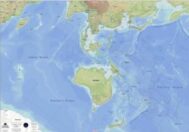
Australia has peeled back China trade coercion as it ramps-up the alliance with the United States to balance China. The Labor government, elected in May 2022, claims a diplomatic thaw with China as a key achievement. The major defense step was agreeing for Australia to get nuclear submarines under the AUKUS agreement with Britain and the United States. The government’s 2023 National Defense Statement describes “an intense contest of values” in the Indo-Pacific, with growing “risks of military escalation or miscalculation.” Because of the worsening strategic environment, the Australian Defense Force is judged “not fully fit for purpose” as the government seeks greater long-range strike capability. The era of alliance integration will see more US troops, planes, and ships in Australia, and the creation of a US-Australia combined intelligence center in Canberra. The contest with China in the South Pacific frames a new Australian aid policy and a greater US role in the islands.

Australia-US/East Asia
September 2021 — August 2022Australia’s New Government: Climate, China and AUKUS
Australia has changed government and the political war over climate change draws to a close after raging for 15 years. The new Labor government led by Anthony Albanese promises continuity on foreign and defense policy, delivered with a different tone. In the government’s first 100 days, it chipped some ice from the frosty relationship with China. Ending a Beijing ban on meetings with Australian ministers that was in its third year, Chinese ministers had face-to-face talks with Australia’s foreign minister and defense minister. Albanese’s observation that dealing with China will continue to be difficult was demonstrated by a diplomatic duel in the South Pacific, as Canberra pushed back at Beijing’s ambition for a greater security role in islands. Two major defense announcements are due in the first months of 2023: the plan for an Australian nuclear submarine, based on the AUKUS agreement with the US and UK, plus a re-set of Australia’s military and strategic posture because of the toughest security environment in decades. Labor says the alliance with the US should go “beyond interoperability to interchangeability” so the two militaries can “operate seamlessly together at speed.”
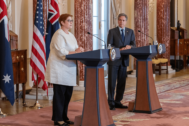
Australia-US/East Asia
September 2020 — August 2021COVID and China Chill, Alliance Anniversary and Afghanistan
Australia closed its borders to confront COVID-19 and rode out recession, while China shut off key markets to punish Australia. The short recession caused by pandemic ended Australia’s record run of nearly three decades of continuous economic growth; Beijing’s coercion crunched the optimism of three decades of economic enmeshment. However, Australia’s economy rebounded while the China crunch continues, causing Australia to question its status as the most China-dependent economy in the developed world. The Canberra-Beijing iciness has built over five years, marking the lowest period since the establishment of diplomatic relations in 1972. In 2021, the language of “strategic partnership” died and the “strategic economic dialogue” was suspended by China. The Biden administration promised not to abandon Australia, saying that US-China relations would not improve while an ally faced coercion. Australia embraced Washington’s assurance, along with the elevation of the Quad with the US, Japan, and India.
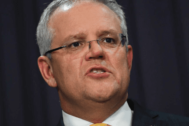
Australia-US/East Asia
September 2019 — August 2020Coronavirus, China and the US New Normal
Challenged by COVID-19 and China, Australia confronts deteriorating strategic prospects and its first economic recession in nearly 30 years. The pandemic has worsened strained relations between Australia and China. Canberra’s call for an inquiry into the origins of COVID-19 was attacked by Beijing as a betrayal and Chinese trade retaliation has followed. Even before the pandemic hit, Australia talked of a “new normal” with China of “enduring differences.” Whatever the US election result, the phrase “new normal” is also being applied to changes wrought by President Trump. The US alliance is hugged anew as Canberra abandons a central strategic tenet held for 50 years—the idea that Australia would have 10 years warning of any direct military threat.
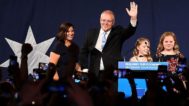
Australia-US/East Asia
September 2018 — August 2019Scott Morrison, Donald Trump, and the Indo-Pacific
Echoing uncertain geopolitical times, Australian politics confounded opinion polls and pundits at the May 18 federal election. Re-election of the Liberal-National coalition government was a “miracle” result, according to Prime Minister Scott Morrison. The surprise victory transformed Morrison’s authority within his party and the country – and burnished his relationship with US President Donald Trump. Morrison says the shift in the US-China relationship from engagement to competition is “inevitable,” calling for the Indo-Pacific to deepen patterns of cooperation so the competition does not become adversarial. Australia was an early adopter of the Indo-Pacific concept, describing it as a useful geographic construct. Now Australia is embracing the Indo-Pacific not merely as construct, but as a US strategy – the Free and Open Indo-Pacific.
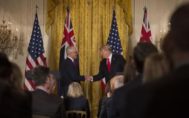
Australia-US/East Asia
September 2017 — August 2018Turnbull Tumbles, Trump Mateship, China Frost
In a week of political mayhem, Australia’s ruling Liberal Party dumped its leader, Prime Minister Malcolm Turnbull, and shunned its deputy leader, Foreign Minister Julie Bishop. While the political unrest is deeply domestic in nature, it shares one element with Australian’s foreign policy concerns – uncertainty. The Australia-US relationship under Donald Trump has been defined by what the president has NOT done to Australia. Trump hasn’t questioned the alliance; hasn’t hit Australia with trade tirades and tariffs; hasn’t broken the refugee deal he so denounced when first taking office; and hasn’t even sent an ambassador to Australia. Canberra’s softly-softly approach to Trump is to talk up the military history – “100 years of mateship” – stressing Australia is an alliance partner that doesn’t cost the US much. A major talking-point is that Australia has a trade deficit with the US. In the way that Trump defines trade relationships, the US makes a profit out of Australia. In contrast, the relationship with China has gone through an icy patch.
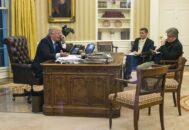
Australia-US/East Asia
May — August 2017The Donald Dichotomy: US Leadership Without the Leader
The uncertainty generated by President Donald Trump has made Australia cling ever tighter to the US alliance. The Trump effect hit Canberra within days of Trump taking office. The phrase “shock and awe” springs to mind – rendered in the alliance realm as “shake and appall.” The first phone conversation between Trump and Prime Minister Malcolm Turnbull was a version of “shake, rattle and roll.” Canberra wants to play nice with The Donald, and say nothing publicly that is critical of the president. The template for the Australian approach was on display early when the president withdrew the US from the Trans-Pacific Partnership. The Turnbull government expressed great regret at the decision but said nothing about the man who’d made it. While striving not to affront the president, Australia’s language about China has become shriller. Tongue-tied by Trump, Canberra gives stronger voice to concerns about China. Turnbull has referred to the “dark view” of a “coercive China” seeking Asia domination. Stern words about China’s threat to the rules-based system serve a dual purpose: speak to Beijing about the value of the system while implicitly pleading with the US not to abandon what it has built and policed – and mightily profited from.
Australia-US/East Asia
September — August 2016Turnbull, TPP, and Trump
While Malcolm Turnbull’s coalition government was narrowly returned to office in Australia’s 2016 election, Australia’s thinking about Asia’s future hinges on another election. Concern about the US presidential race has joined worries about Asia’s “rules-based order” and growing competition between the US and China. Not least of Australia’s fears is what US politics will do to the Trans-Pacific Partnership trade deal. Meanwhile, there were a few “surprises” between Australia, the US, and Japan that shaped relations over the summer months and will likely continue to influence them in the coming year.
Australia-US/East Asia
September 2014 — August 2015Alliance, Trade, Climate, and China
The Obama administration and the Abbott government stood together in the new military coalition in Iraq and joined in the trade push for a Trans-Pacific Partnership. Australia’s Defence White Paper, about to be released, will be a strong and detailed statement of support for the alliance with the US. Yet, the discussion of the US-Australia relationship often turned into a debate about China. The notable political difference between Obama and Abbott in the past 12 months was over climate change. The US president highlighted the policy difference in a speech during the G20 Summit that Abbott hosted in Brisbane. The other divergence between Australia and the US was over China’s creation of the Asian Infrastructure Investment Bank. After initially sharing US fears about the bank, the Abbott government eventually decided to abandon the US and Japan and became a founding member.
Australia-US/East Asia
May — August 2014China Bumps, Indonesia Breach, Japan as Ally
On the first anniversary of its election on Sept. 7, the Australian Coalition government’s foreign policy report card showed excellent relations with the US and Japan, a major diplomatic blow-up with Indonesia, and bumps with China. Tony Abbott’s government is completing the withdrawal of Australian forces from Afghanistan, but the alliance and humanitarian arguments are drawing Australia back toward Iraq. The US rebalance to Asia is seeing more Marines rotate through northern Australia, and the US has similar plans for its ships and planes. The growth of the US-Japan-Australia trilateral relationship has prompted one former prime minister to argue that Australia has more to fear from provocative actions by its trilateral partners than from China. For Australia today, to discuss the alliance is also to talk about China.